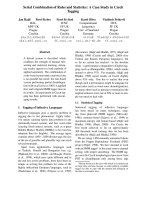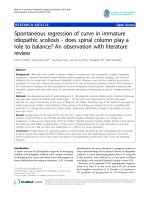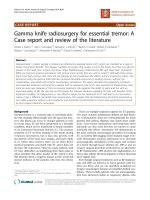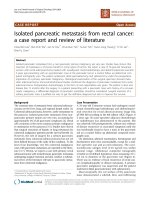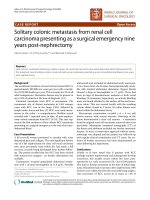Báo cáo khoa hoc:" Spontaneous regression of metastatic renal cell carcinoma: case report" pps
Bạn đang xem bản rút gọn của tài liệu. Xem và tải ngay bản đầy đủ của tài liệu tại đây (1.04 MB, 3 trang )
BioMed Central
Page 1 of 3
(page number not for citation purposes)
Journal of Medical Case Reports
Open Access
Case report
Spontaneous regression of metastatic renal cell carcinoma:
case report
Katerina Lekanidi
1
, Paraskevi A Vlachou*
2
, Bruno Morgan
2
and
Subramaniam Vasanthan
3
Address:
1
Department of Medicine, Leicester Royal Infirmary, Leicester, LE1 5WW, UK,
2
Department of Radiology, Leicester Royal Infirmary,
Leicester, LE1 5WW, UK and
3
Department of Oncology, Leicester Royal Infirmary, Leicester, LE1 5WW, UK
Email: Katerina Lekanidi - ; Paraskevi A Vlachou* - ;
Bruno Morgan - ; Subramaniam Vasanthan -
* Corresponding author
Abstract
Spontaneous regression of metastatic renal cell carcinoma is rarely observed. A case of suspected
spontaneous regression of pulmonary metastases following nephrectomy for histologically proven
renal cell carcinoma without systemic treatment is presented along with a brief review of the
literature.
Case presentation
A 60 year old man, who was under regular haematological
follow-up because of myelofibrosis, presented at a routine
clinic visit complaining of increasing shortness of breath,
weight loss and lethargy. Clinical examination of the chest
was normal but a chest x-ray (CXR) showed multiple lung
lesions consistent with metastatic deposits (figure 1). A
staging computed tomography (CT) scan done shortly
afterwards showed marked splenomegaly, causing dis-
placement of the left kidney medially. In the left kidney,
there was a 5 cm soft tissue mass arising from the middle
of the kidney with characteristics of primary renal cancer
(figure 2). The staging CT chest showed multiple pulmo-
nary metastases in both lungs.
The patient underwent laparoscopic cytoreductive
nephrectomy without complications and agreed to have
immunotherapy with alpha-interferon. Histology
revealed clear cell renal cell carcinoma. Six weeks follow-
ing the operation, just prior to commencing immuno-
therapy, he attended the haematology clinic as routine
follow-up. His initial symptoms had completely resolved
and a repeat chest radiograph on that day showed clear
lungs with no evidence of metastatic deposits (figure 3).
Although no histological confirmation of the metastatic
nature of the lung lesions was obtained, it is highly likely
that his pulmonary metastases had regressed spontane-
ously as the patient had not received any immunotherapy
in the meantime. The patient remains well five months
after the operation.
Renal cell cancer accounts for 2% of all cancers and its
incidence is steadily rising. It usually presents in late adult
life and is more common in males than females. Although
they are associated with Von Hippel-Lindau disease, adult
polycystic kidney disease and multicystic nephroma, most
renal cell cancers develop spontaneously [1].
The patient may present with urological symptoms such
as haematuria or flank pain or with an abdominal mass or
Published: 18 September 2007
Journal of Medical Case Reports 2007, 1:89 doi:10.1186/1752-1947-1-89
Received: 18 June 2007
Accepted: 18 September 2007
This article is available from: />© 2007 Lekanidi et al; licensee BioMed Central Ltd.
This is an Open Access article distributed under the terms of the Creative Commons Attribution License ( />),
which permits unrestricted use, distribution, and reproduction in any medium, provided the original work is properly cited.
Journal of Medical Case Reports 2007, 1:89 />Page 2 of 3
(page number not for citation purposes)
alternatively with systemic manifestations, such as anae-
mia and fever, or symptoms of metastatic disease and
other rare phenomena [2].
Approximately 20% to 30% of patients with renal cell car-
cinoma present with metastatic disease, and 20% to 40%
of patients undergoing nephrectomy for clinically local-
ized disease will develop metastasis [3]. If the tumor can-
not be completely resected, the course is generally
relentlessly progressive, with median survival of 12 to 18
months after metastasis. 85% of relapses occur in the first
three years [4].
However, a group of patients with advanced disease have
experienced improvements in survival, which is partly
related to the introduction of immunotherapeutic
approaches and a better understanding of the role and
timing of cytoreductive nephrectomy. Although the bene-
fits of immunotherapy have been displayed repeatedly by
several studies, controversy has existed as to the need for
adjunctive nephrectomy in treating metastatic patients.
Removal of the malignant kidney may be of palliative
benefit in some settings of metastatic renal cell carcinoma
[5]. There have been studies to demonstrate that the ben-
efits of nephrectomy are in addition to and probably
greater than the benefit resulting from the interferon-
alpha that all patients would receive. Others argue that
immunotherapy as a modality has had disappointingly
little proven impact on the survival of patients with
advanced renal cell carcinoma compared to a variety of
other options with less toxicity [6].
There have been case reports in the literature that describe
spontaneous regression of metastatic renal cancer [2,7-
12].
Bumpus described the first reported case of spontaneous
regression of metastatic renal cell carcinoma in 1928 [7].
Metastatic sites include brain, bone, hilar adenopathy and
most commonly pulmonary metastases. The clinical pat-
tern of the improvement is not uncommonly the com-
plete disappearance of disease, and often the regression is
long-lasting. Many of these cases are associated with sur-
CXR showing no evidence of lung metastases at six weeks after nephrectomyFigure 3
CXR showing no evidence of lung metastases at six weeks
after nephrectomy.
CXR showing multiple bilateral lung metastases at diagnosisFigure 1
CXR showing multiple bilateral lung metastases at diagnosis.
CT showing a left renal carcinoma (white arrow) and splenomegalyFigure 2
CT showing a left renal carcinoma (white arrow) and
splenomegaly.
Publish with BioMed Central and every
scientist can read your work free of charge
"BioMed Central will be the most significant development for
disseminating the results of biomedical research in our lifetime."
Sir Paul Nurse, Cancer Research UK
Your research papers will be:
available free of charge to the entire biomedical community
peer reviewed and published immediately upon acceptance
cited in PubMed and archived on PubMed Central
yours — you keep the copyright
Submit your manuscript here:
/>BioMedcentral
Journal of Medical Case Reports 2007, 1:89 />Page 3 of 3
(page number not for citation purposes)
gical removal of the primary tumor, but regression can
also occur in association to radiation or embolization of
the primary tumor [8].
The rarity of the observation and the heterogeneity of the
clinical circumstances in which spontaneous regression of
disease occurs do not provide the opportunity for insight
into the pathophysiologic mechanism or into the capabil-
ity for the identification of potential candidates for regres-
sion. Although no single mechanism can completely
account for this phenomenon, it can be speculated that
resection of the primary tumour may result in removal of
a prometastatic or growth factor secreted by the tumour
and/or promotion of apoptosis might be involved. Immu-
nologic factors almost certainly play a role in some cases
of spontaneous tumour regression and perhaps removal
of bulk tumour enables or stimulates the immune system
to control residual disease. Other theories include hormo-
nal changes, trauma and changes in blood supply (via
inhibition of angiogenesis by cytokines) [9].
Conclusion
It is important to recognize the existence of this clinical
entity, which, although rare, might provide another argu-
ment in favour of surgical intervention or immunological
treatment of metastatic renal cancer. The observation itself
should also provide encouragement and drive to pursue
immunologic as well as other investigations of the dis-
ease.
Competing interests
The authors declare that they have no competing interests.
Authors' contributions
SV conceived of the case.
PAV and KL drafted the manuscript.
BM finalized the manuscript.
All authors have read and approved the final manuscript.
Acknowledgements
None
References
1. Motzer RJ, Bander NH, Nanus DM: Renal-cell carcinoma. N Engl
J Med 1996, 335:865-875.
2. Hamid Y, Poller DN: Spontaneous regression of renal cell car-
cinoma: a pitfall in diagnosis of renal lesions. Journal of Clinical
Pathology 1998, 51(4):334-337.
3. Lam JS, Shvarts O, Leppert JT, Figlin RA, Belldegrun AS: Renal Cell
Carcinoma 2005: new frontiers in staging, prognostication
and targeted molecular therapy. J Urol 2005, 173:1853-1862.
4. Rabinovitch RA, Zelefsky MJ, Gaynor JJ, Fuks Z: Patterns of failure
following surgical resection of renal cell carcinoma: implica-
tions of adjuvant local and systemic therapy. J Clin Oncol 1994,
12:206-212.
5. Lam JS, Brenda A, Belldegrun AS: Evolving principles of surgical
management and prognostic factors for outcome in renal
cell carcinoma. J Clin Oncol 2006, 24(35):5565-5575.
6. Coppin C, Porzsolt F, Awa A, Kumpf J, Goldman A, Wilt T: Immu-
notherapy for advanced renal cell cancer. Cochrane database of
systematic reviews 2004:Art. No: CD001425
7. Bumpus HC: The apparent disappearance of pulmonary
metastasis in a case of hypernephroma following nephrec-
tomy. J Urol 1928, 20:185-191.
8. Lokich J: Spontaneous regression of metastatic renal cancer:
case report and literature review. Am J Clin Oncol 1997,
20(4):416-418.
9. Papac RJ: Spontaneous regression of cancer. Cancer Treat Rev
1996, 22:395-423.
10. Nakajima T, Suzuki M, Ando S, Iida T, Araki A, Fujisawa T, Kimura H:
Spontaneous regression of bone metastasis from renal cell
carcinoma; a case report. BMC Cancer 2006, 6:11.
11. Hammad AM, Paris GR, Van Heuven WA, Thompson IM, Fitzsim-
mons TD: Spontaneous regression of choroidal metastasis
from renal cell carcinoma. American Journal of Ophthalmology
2003, 135(6):911-3.
12. Wyczólkowski M, Klima W, Bieda W, Walas K: Spontaneous
regression of hepatic metastases after nephrectomy and
metastasectomy of renal cell carcinoma. Urologia Internationalis
2001, 66(2):119-20.
